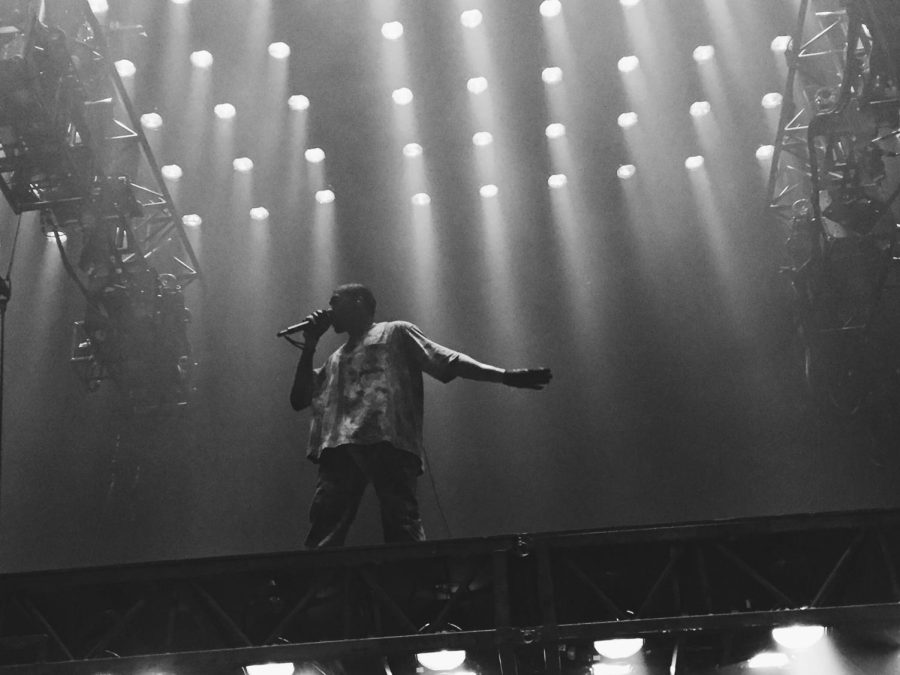Arts x Arts: To Love or Not To Love? Separating the Art From the Artist
Kanye West at the Saint Pablo Tour on Sept. 5, 2016. (Photo via Jamielandis101 | CC BY-SA 4.0)
January 2, 2023
All throughout the world, there are many forms of art celebrated and loved by many. We find pleasure in our favorite songs, paintings, books, films, dance and fashion, but it raises the question of what happens when the artist has been or is problematic. The first thought that comes to mind when someone mentions separating the art from the artist is likely a case along the lines of J.K. Rowling and her blatant transphobia or Michael Jackson and his history of pedophilia. Does supporting that artist cloud our moral judgment? Do we completely cut ties with that artist?
Eliza’s Thoughts
Here are a few examples of why separating the art from the artist can be important.
Cancel Culture
Social media has played an immense role to most in recent years and is a way many of us receive news about what is happening around the world. Because of the growth of social media, many celebrities are careful about what they say or do online. But what happens when they aren’t? When a celebrity is caught doing something inappropriate or wrong, many people take to the internet to call them out and possibly cancel them.
But is cancel culture really helpful in calling out celebrities? It seems like few choose who gets canceled. I’ve noticed that when this occurs, it is because some people praise or love that artist. In early October, Ye, the artist formerly known as Kanye West, hosted his own fashion show in Paris for Fashion Week. Ye captured the media’s attention when he wore a “White Lives Matter” shirt. He didn’t do so to call out the fake supporters of the Black Lives Matter movement, however, but rather because he thought “the shirt was a funny shirt.” Ye’s “fashion statement” is not only disrespectful but disregards those who lost their lives to police brutality and violence.
Although many celebrities and fans called out the rapper’s inappropriate behavior, others condoned and applauded Ye. Despite many similar counts of problematic behavior, Ye continues to garner over 50 million monthly listeners on Spotify and has earned four number-one singles on the Billboard Hot 100. One would think that with all the remarks Ye has made, he would no longer have a following. Though it seems that some people choose to still enjoy Ye’s music and separate his character from his art, others still support and listen to Ye. There is still that freedom within cancel culture that doesn’t quite scare an artist away completely, as well as their supporters.
Recognition
In today’s world, one is easily influenced by social media. In some cases, the remarks or actions of an artist are not tied to their artwork. A song or a film can be made years prior to remarks or allegations against the artist. If the artwork can stand alone without it being associated with the artist, it is really up to you if you choose to support it. If you do choose to support an artist or to continue to support their work, it is important to recognize the problem and controversy made by the artist. It is also important to note if the art enforces the artist’s ideas. You can still enjoy that song, clothing brand or film, but make sure to not idolize the artist as that can perpetuate more damage to the affected community and can come off as ignorant.
Nostalgia
Separating the art from the artist becomes quite more difficult when you personally have a connection to the art. For example, many children and adults enjoy “Harry Potter” by Rowling. The series has brought families together and allowed individuals to experience the magical Wizarding World of Harry Potter at Universal Studios. Whether it is the books or movies, many experience similar excitement and thrill from the series, especially if it brings back memories and nostalgia as an adult after loving the series as a child.
I think it is important to cherish those memories and not let anyone taint those special moments for you. In response to Rowling’s transphobic remarks, Daniel Radcliffe, who played the titular character in the movies, said “If you believe that a particular character is trans, nonbinary or gender fluid, or that they are gay or bisexual; if you found anything in these stories that resonated with you and helped you at any time in your life — then that is between you and the book that you read, and it is sacred.” This statement resonates not only with the “Harry Potter” series, but any other form of art that has a special connection to you. Art is sacred and beautiful when you connect it to a particular moment in your life. You should not feel guilty for having those feelings or moments that once resonated with you.
Audrey’s Thoughts
On the more precarious side of things, actors, authors, musicians and comedians are all particularly influential in their communities. When their problematic tendencies are brought to light, whether through hard evidence or reliable accusations, society often chooses to either cancel them for a short period of time or completely ignore what happened. This is much more of an issue than many see initially.
Musicians
Dr. Dre and Chris Brown have been accused of domestic violence and continue to have 18 and 47 million monthly listeners respectively on Spotify alone. Not only have both been accused of assaulting multiple women, but their music itself has been known to include offensive lyrics. When singing along to lyrics we don’t really listen to, songs become nothing more than a melody and a bass line that we can feel but don’t inspect. Music and lyrics are impactful on our subconscious, and there is an inevitable connection between the words we hear and the way we feel. When songs are catchy and relatable to a very shallow degree, we hold musicians on a pedestal for their creations but don’t take the time to look deeper into what those creations are based around, which can spread hate unintentionally.
Even musicians who were seen as icons for underrepresented communities, like the LGBTQ+ community in the case of David Bowie, are more problematic than many seem to recognize. According to Far Out Magazine, an interview during Bowie’s mid-70s “Thin White Duke” era with Playboy Magazine resulted in his infamous statement that Adolf Hitler was “one of the first rock stars.” Whether this was a show to garner attention or his true beliefs, there is no excuse for defending one of the worst genocides in history and the man behind it all. People look up to Bowie as someone they want to be, but they’re only looking at a part of the whole. They want him to be the androgynous singer who wrote songs with outwardly queer lyrics and inspired millions to be themselves, not the musician who had sexual relations with a 15-year-old girl and defended a dictator.
Comedians
On the first two lists you’ll find after googling “the funniest comedians of 2022”, Dave Chappelle is top ranked. He gets millions of views for standup bits posted by Comedy Club, and on a video from LaughPlanet titled “Dave Chappelle Is A Comedic Genius,” comments refer to Chappelle as a “national treasure” and “our generation’s storyteller.” Something that is often ignored, however, is the glaring transphobia often brought up in Chappelle’s routines. An article from BBC News quotes multiple Netflix specials featuring Chappelle in which he called gender “a fact” and described trans people as “confusing.”
Gen Z is commonly known as a generation committed to spreading love and acceptance for all communities, and passing off the transphobic comments of a man praised for his “comedic genius” as an inherent flaw that can be separated from his “art” is plain ignorance. It creates a similar expectation as those present in the ’40s and ’50s, where as long as you’re making people laugh, anything goes. Nowadays, we’re looking back at the jokes made by comedians like Bob Hope and Bing Crosby that were funny at the time with complete and utter disgust at what was once accepted.
Authors
Margaret Atwood, famed author of “The Handmaid’s Tale,” has disappointed fans of the book-turned-TV series with her anti-feminist remarks. Ironically enough, “The Handmaid’s Tale” is a dystopian novel about a society that treats women as property of the state. Fertile women are forced into sexual enslavement and many, including the main character, Offred, have their daughters taken from them. Offred has been an inspiration to many, including a former fan who wrote a letter to Atwood. “When you lost the plot this week and signed onto an open letter with so-many-Canadian-authors-that-fill-my-bookcase, it was downright shocking. 2016 has put us women through a lot but this felt like the ultimate betrayal,” said the fan.
The open letter to which the former fan was referring is one that defends Steven Galloway, a novelist who was accused of sexual assault against a graduate student. If we don’t separate the art from the artist in this case, “The Handmaid’s Tale” suddenly becomes a very different story. Does the main villain of the story become the self-insert from the author rather than the protagonist? Readers may suddenly feel that Atwood is supportive of the universe she has created and that it’s not so much a dystopian novel to her as a utopian one.
Overall, it is vital to be conscious of the artwork we consume and its creators in order to combat hatred and bigotry, whether obvious or not. Art should be for all, and we as consumers have to power to maintain that truth.
audrey.hall@dailyutahchronicle.com













